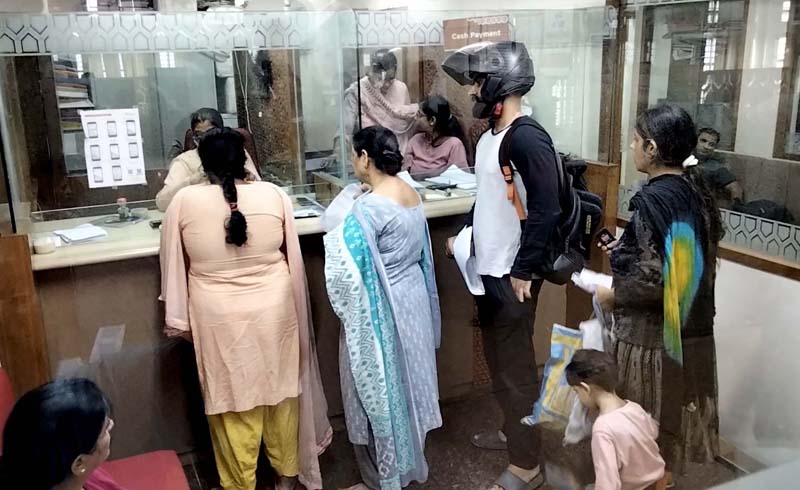Confusion over documents among bankers, people
Bivek Mathur
JAMMU, May 23: As part of the “Clean Note Policy” of the Reserve Bank of India (RBI), the exchange/deposit of the junked Rs 2000 denomination banknotes began in a hassle-free environment in Jammu and Kashmir today.
Click here to watch video
However, confusion prevailed equally among the bankers as well as the public regarding requirement of identity proofs to exchange Rs 2000 notes as there were no clear-cut instructions from the country’s central bank, RBI.
While State Bank of India (SBI) said its staff across Jammu and Kashmir had been asked to exchange Rs 2000 notes up to a limit of Rs 20000 without asking anyone to fill out any form or asking for the identity proof of the person willing to exchange the notes, the J&K Bank claimed some of its branches asked for the identity proof, others didn’t. The other public sector and private banks said that their staff asked for the identity proof for exchange of Rs 2000 notes as without identity proof there was a possibility of faking of identity by a single person to withdraw any amount beyond a permissible limit.
As per RBI guidelines issued on Friday, a person can exchange only up to a limit of Rs 20,000 at a time.
Sandeep Choudhary, the Branch Manager of SBI’s Lal Chowk, Srinagar Branch, told the Excelsior, “we had given clear-cut instructions to our staff to exchange the withdrawn notes without demanding identity cards as proofs or asking anyone to fill out any forms.”
“For depositing amounts larger than Rs 20000 in Rs 2000 notes, the existing process followed,” he said.
Asked about the rush of the customers in Lal Chowk Branch of the SBI, he said, “no, there was no rush of the people as enough time has been given by the Reserve Bank of India to exchange or deposit the withdrawn notes.”
“Some of our branches asked for the identity cards of the people visiting the banks for exchange of Rs 2000 notes ,others didn’t,” said a J&K Bank’s Gandhi Nagar Branch Jammu staffer on condition of anonymity.
He said, “our staff didn’t ask for the identity proof of the bank’s customers but people who are not our customers were definitely asked to show their identity proofs.”
“If it was not done so, there was possibility of people faking their identity to exchange amounts beyond a permissible limit,” he said.
A Canara Bank staffer at Udhampur too said that his bank branch also asked for Aadhar as an identity proof for exchange of Rs 2000 notes.
At the national level as well, some banks exchanged notes by making an electronic entry, few others asked customers to pen down their name and mobile number in a register without giving any identity proof.
At some places, however, customers said they were asked to present their PAN or Aadhar cards. A small number of customers claimed the bank they visited didn’t exchange the notes and instead asked them to deposit those in their accounts.
Meanwhile, people visiting different bank branches for exchanging their Rs 2000 notes expressed satisfaction over the arrangements made.
Puran Chand Sharma, a customer at Punjab National Bank’s Bakshi Nagar Jammu Branch told the Excelsior that unlike 2016, when the demonetisation was done owing to which people had to face a lot of difficulties, he didn’t face any difficulty in exchanging his Rs 2000 notes today.
“Enough time has been given by the Government to exchange the junked notes now. I had come to the bank to deposit the PDD tariff. Had this not been the case I too would have exchanged my notes sometimes later,” he said.
“Hardly two to three people have exchanged their notes in this branch today,” he further said. He thanked the Government for simplifying the process in 2023.
A J&K Bank customer, Rajni Gupta, said, “everything is going on smoothly as enough time has been given by the Government this year to deposit or exchange the junked notes unlike 2016 when there was chaos all around.”
“Bank staff is also cooperative and they’re helping people exchange or deposit their notes,” she said.
Pertinently, Rs 2000 denomination banknote was introduced in November 2016 under section 24(1) of the RBI Act, 1934, primarily to meet the currency requirement of the economy in an expeditious manner after the withdrawal of legal tender status of all Rs 500 and Rs 1000 banknotes-constituting some 86% of the currency in circulation-at that time.
According to RBI, the objective of introducing Rs 2000 banknotes was met once banknotes in other denominations became available in adequate quantities. Therefore, printing of Rs 2000 banknotes was stopped in 2018-19.
“About 89% of Rs 2000 denomination banknotes were issued prior to March 2017 and are at the end of their estimated life-span of 4-5 years. The total value of these banknotes in circulation has declined from Rs 6.73 lakh crore at its peak as on March 31, 2018 (37.3% of Notes in Circulation) to Rs 3.62 lakh crore constituting only 10.8% of notes in Circulation on March 31, 2023,” the RBI said in a statement.
“It has also been observed that this denomination is not commonly used for transactions. Further, the stock of banknotes in other denominations continues to be adequate to meet the currency requirement of the public,” the Central Bank said.
“In view of the same, and in pursuance of the ‘Clean Note Policy’ of the Reserve Bank of India, it has been decided to withdraw the Rs 2000 denomination banknotes from circulation. The banknotes in Rs 2000 denomination will continue to be legal tender,” it further said.
It may be noted here that RBI had undertaken a similar withdrawal of notes from circulation in 2013-2014.


